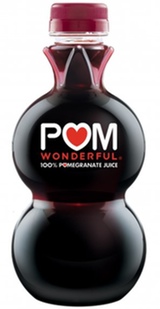
POM Wonderful, you are not so wonderful, after all.
A judge has ruled that the company that sells pomegranate juice violated federal law by advertising deceptive health benefits about its products, claiming the juice can treat, prevent, or reduce the risk of heart disease, prostate cancer, and erectile dysfunction.
All lies, apparently, and very misleading.
The Federal Trade Commission first filed a complaint about POM Wonderful in September 2010, charging that the company’s false advertisements featured in publications such as Fitness magazine and the New York Times were not backed up by reliable research. One ad in Prevention magazine ran with the headline “Cheat Death.” Another ad stated, “Only POM is backed by $25 million in medical research conducted at the world’s leading universities.”
The FTC’s press release stated: “Many of their scientific studies did not show benefits from using POM products for treating or preventing heart disease. It alleged that the prostate cancer claims were false and unsubstantiated because, among other reasons, the study the POM respondents relied on was neither ‘blinded’ nor controlled. Finally, it alleged that the erectile dysfunction claims were false and unsubstantiated because the study on which the company relied on did not show that POM Juice was any more effective than a placebo.”
Chief administrative law judge D. Michael Chappell upheld the FTC’s complaint in a 335-page ruling, saying POM is prohibited from making any claims that its product is “effective in the diagnosis, cure, mitigation, treatment, or prevention of any disease [. . .] unless, at the time it is made, the representation is non-misleading and, respondents possessed and relied upon competent and reliable scientific evidence.”
POM Wonderful is also under a five-year probation period, during which the company will have to provide any future advertisements, labeling, packaging, and promotional materials to the FTC upon request.
The lesson: Take food companies’ health claims with a grain of salt.


















